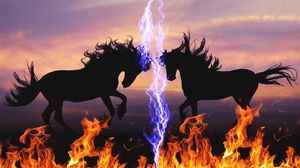Blue Man Group, the beloved trio of cobalt performers, concluded their 34-year run with emotional final performances at the Astor Place Theatre on February 2, 2025. This historic farewell marks the end of an era, having dazzled audiences with 17,800 performances and splashed 82,150 gallons of paint over the years.
The Blue Man Group, which began as an unconventional art piece back in 1991, cultivated its roots deeply within the New York City scene. It was here, in the heart of the East Village, where the unique concept developed, as Bhurin Sead, one of the performers, reflects. "The roots of this show, the heart of the character and show all stems from New York," he said, underscoring the pivotal role the city played.
Throughout their illustrious run, the Blue Man Group became synonymous with avant-garde entertainment, interweaving aspects of performance art, music, and technology. Audiences flooded to see their quirky antics resembling chaos, enjoyment, and often moments of captivating connection. It wasn’t just about entertainment; it was about forming bonds, as Sead mentioned, stating, "When I’m on stage and I see you in the house, I really want to connect with you—people are impacted by what we do.”
One performer, Pete Simpson Jr., who has spent nearly 29 years with the group, recalled similar sentiments about the connections sparked during the shows. "There’s so much sentimentality, nostalgia and love involved in this show," he remarked. With over 5,000 shows under his belt, the highest tally ever, Simpson’s dedication reflects the deep sense of belonging and community the performances cultivated.
While the curtain has fallen on their New York residency, the Blue Man Group isn't disappearing entirely. Productions will continue to run internationally, keeping the spirit alive in cities like Berlin, Boston, Las Vegas, and Orlando. This is not the end but the beginning of new adventures across the globe.
Understanding this transition, Sead also acknowledged the bittersweet nature of closing the curtain on the New York performances. Cirque du Soleil, which took over the production in 2017, made the difficult decision to conclude the longstanding show. This evolution and growth of the show were sentiments echoed by Simpson, who noted, "Blue Man kind of influenced me to do experimental theater; it made it OK to dream bigger and think differently.”
Reflecting on their time as Blue Men, both performers reminisced about the emotional highs and comedic lows experienced on stage. The performances, rich with multimedia storytelling, allowed the performers to express deep personal feelings. “The whole thing about Blue Man is... about connection and trying to connect people,” said Simpson, touching on the essence of the show.
Alumni night celebrations just before their last performances saw previous cast members return to the stage, culminating the experience with blooper reels capturing the laughter and joy shared among many Blue Men over the years. They connected, reminisced, and celebrated the transitions together, marking the closing of this vibrant chapter.
Despite the nostalgia and sentimentality permeated throughout the last performances, both Sead and Simpson look forward to embracing the future. Simpson has transitioned back to his roots within experimental theater, collaborating with groups known for their avant-garde productions, such as the Wooster Group and Elevator Repair Service. His involvement reinforces the notion of innovation and creativity, something the Blue Man Group has always championed.
While the Blue Man Group takes their final bow, they leave behind not only memories but also connections to artistry and the power of theatrical expressions. Each show provided audiences with laughter, reflective experiences, and opportunities to see beyond the ordinary. The legacy will resonate through future performances worldwide, embodying their original belief—that art can unify and connect people, regardless of language or background.
Overall, the Blue Man Group’s farewell was not just the end of their New York performances, but the passing of the torch so their unique brand of joy and connection can continue to thrive on new stages around the world.



